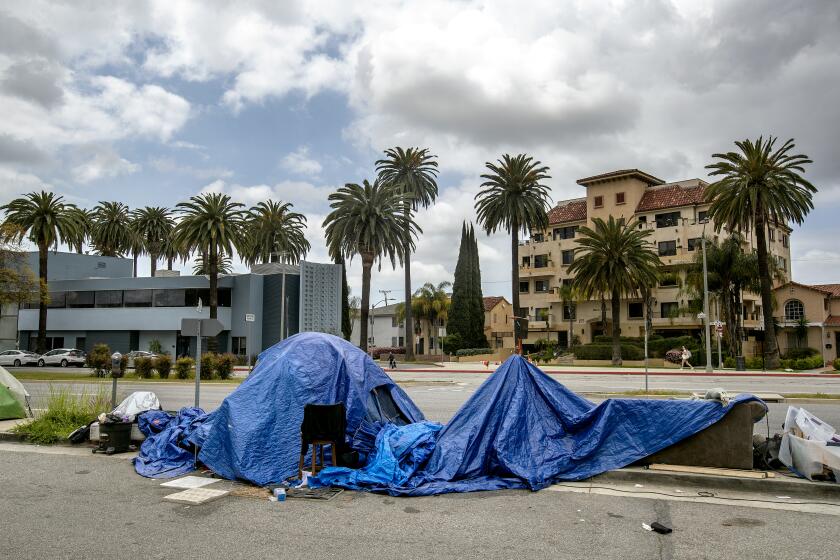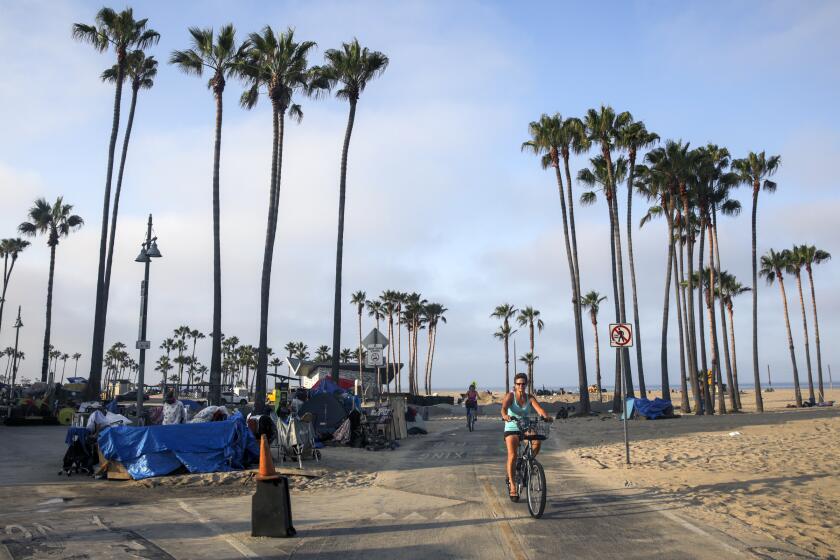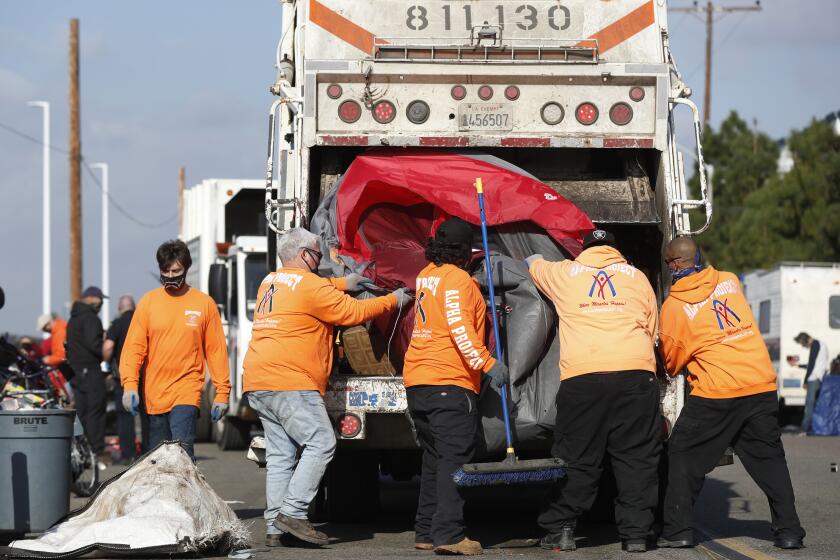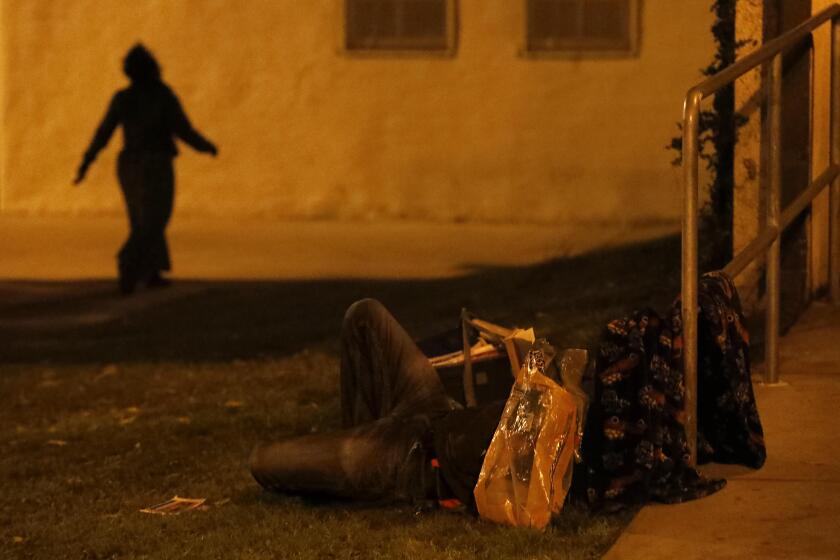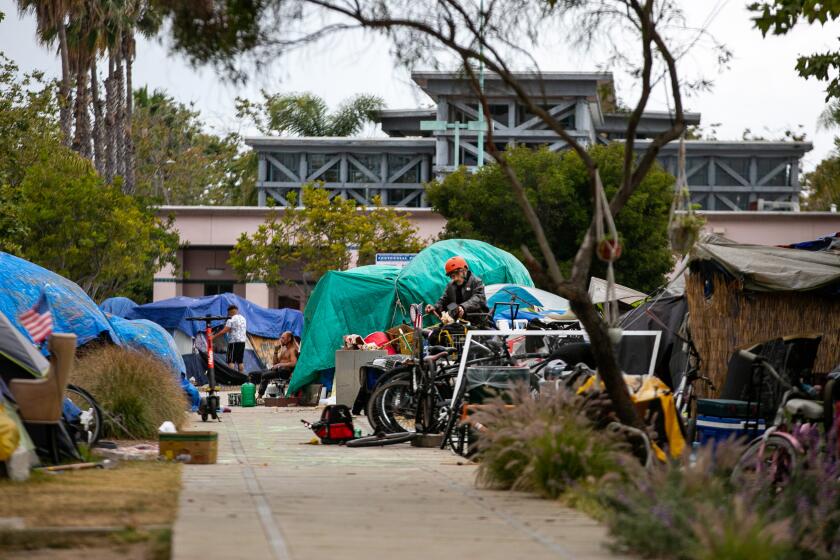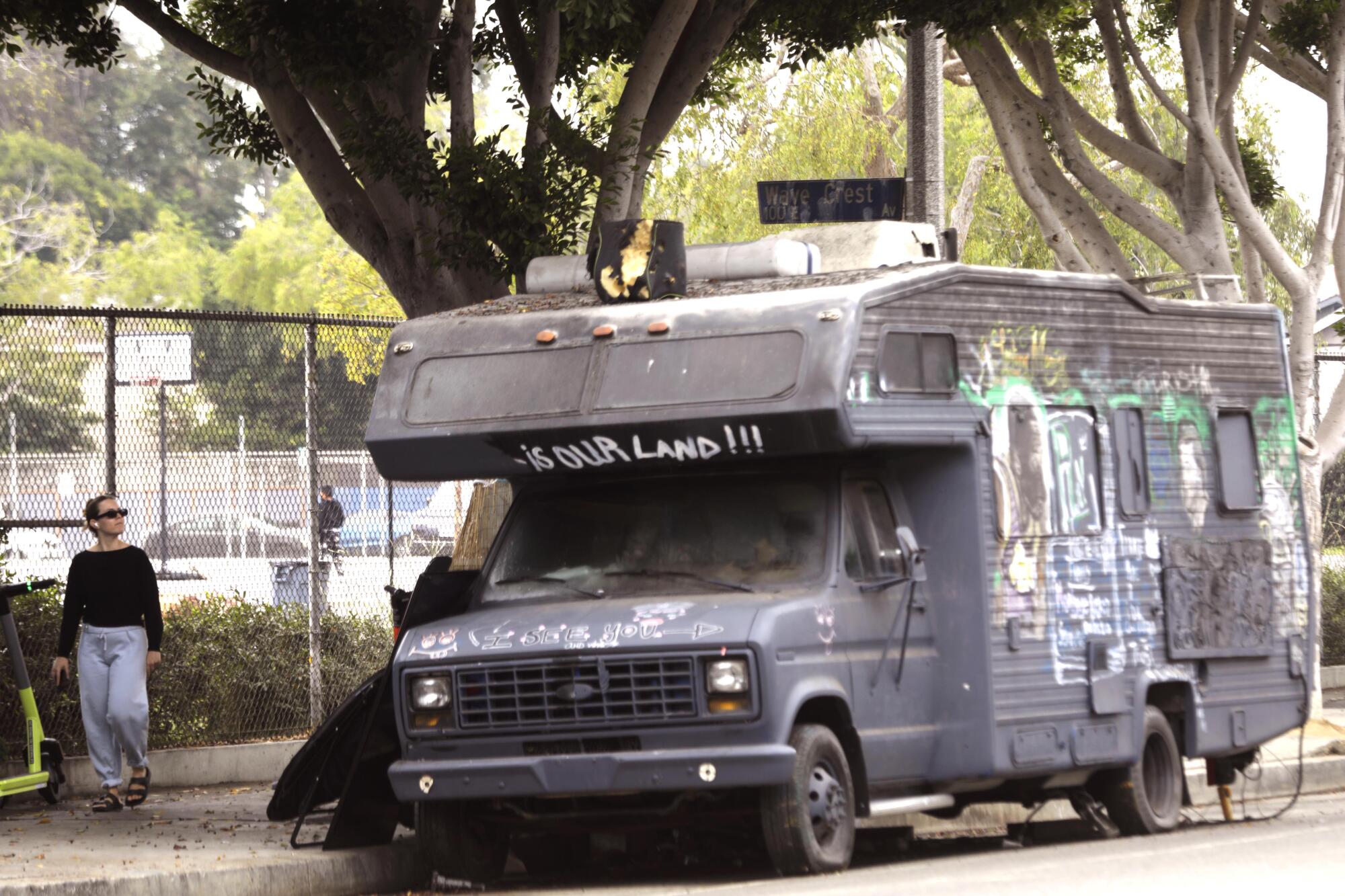
Not all of Los Angeles County’s 70,000 unhoused residents are sleeping on sidewalks or staying in homeless shelters. A majority actually live in cars, vans or RVs. In January, volunteers counted more than 14,000 vehicles being used as residences for an estimated 37,000 people. I spoke with two of them in early October, my Westside neighbors Maria and Toby. They agreed to share their stories with The Times on the condition that their last names not be used. One is employed, and the other was until recently. Each chose to move into an RV because renting a home was consuming too much of their paychecks — not because they had no income, but because they needed to spend their income on food and bills. Maria’s and Toby’s stories remind us that in many cases, the solution to homelessness is painfully simple. It’s nothing so complicated as mental health services or temporary shelters. What a large percentage of the unhoused population needs is just affordable housing. — Robert Karron
Maria
My name is Maria, and I’m 52 years old. I was born in Durango, Mexico, and I’ve been here for 32 years. After I crossed the border with my ex-partner and our 1-year-old baby, we moved to Pacoima, to be with my brother. Then we had two more kids. My youngest is now 18, and he just started college. My oldest, 31, has a job with computers, but he’s not making as much as he did before the pandemic. Both boys are living with me now, in the RV. My daughter just graduated from UCLA, and she’s on her own.
Jermaine, Jason and John all landed on the streets when they were squeezed between high housing costs and low incomes. What could have kept them in their homes?
When I first got here, I worked in fast food. I worked at McDonald’s for 12 years. I learned English at McDonald’s. I fed my family with their paychecks. My ex left when our baby was 1 — 17 years ago. I’ve been on my own since. (I got a court order — he’s supposed to pay child support, but he disappeared.)
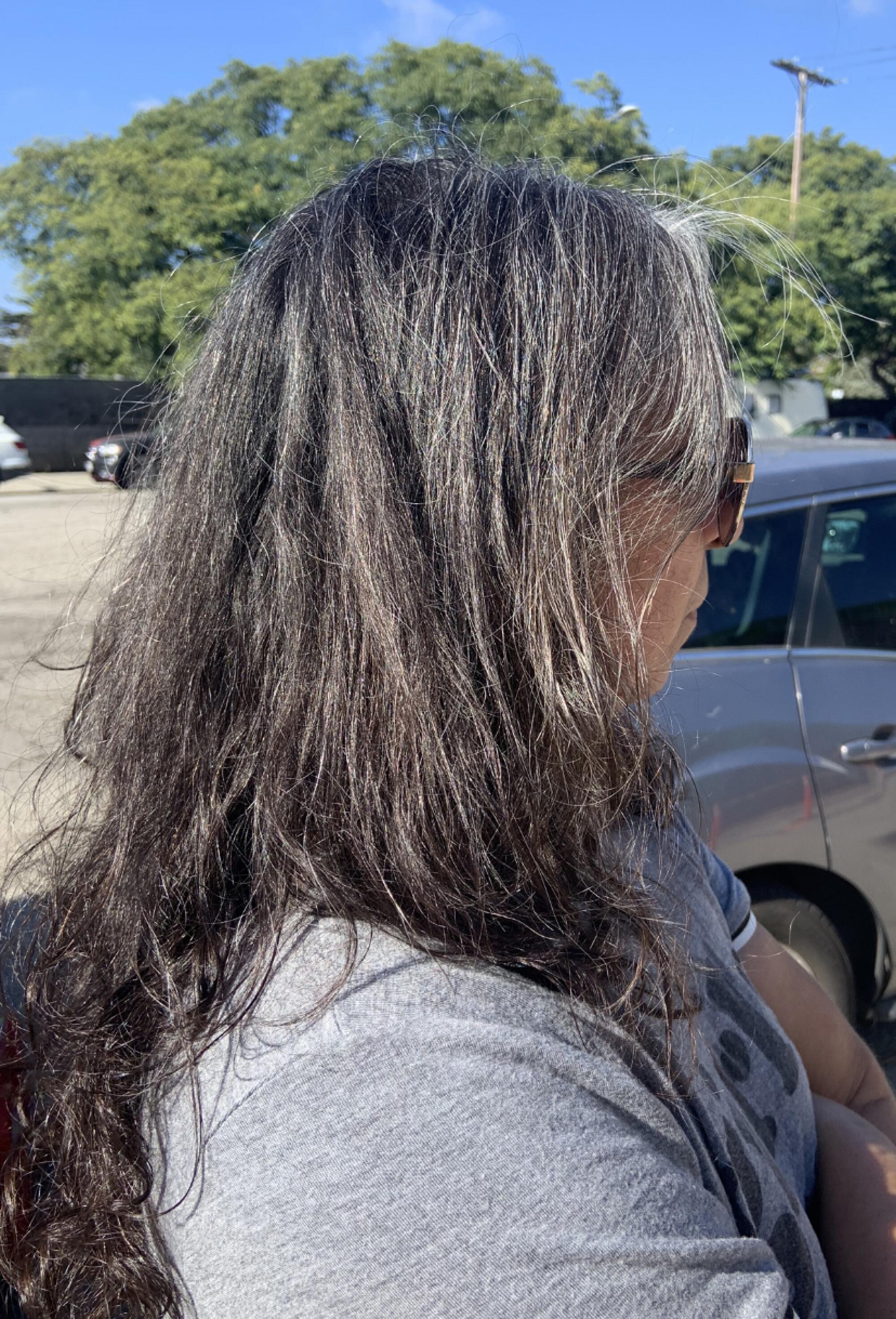
I was an assistant manager at McDonald’s when my youngest was diagnosed with ADHD, so I cut back on my hours to spend more time with him. I got a job at Nordstrom. It paid well, but even then I could only afford rent, nothing else. I was drowning. No food in the fridge, no bills paid. It was breaking my heart because I couldn’t afford a pizza for my kids. If you want to survive, you need two paychecks. Even if you have a good income, the rents are too high.
Andromeda, Erica and Heidi have gotten by for years on the street. Sometimes government helps them, but at other times it makes their lives harder.
Then I met someone who was living in an RV. He showed me how I could do it. He saw how I was struggling, and he told me I had to change my life. I knew I could do it personally, but as a mom it was the hardest decision I’ve ever made. I thought: How in hell am I going to have my kids in the street? But when I looked in my fridge, it was empty. I couldn’t afford clothes, and my son was growing fast. No gas in the car, no new shoes. I had to make a decision. It took me three months, but I finally did it in 2015. At first my kids were against it, but when they saw we could afford food they changed their perspectives.
Now I clean Airbnbs. The pay is good — about $20,000 a year — and I keep getting referrals, but I can’t go back to renting because I’d spend most of my money on rent and eventually I’d be back to where I was, with no money for food or bills. It would all go toward rent. Maybe I can buy a house one day. I don’t need a mansion. Until then, I have to stay here.
A lack of affordable housing is a key factor, according to a study of the nation’s major areas.
I’m not proud of it, but I’m not ashamed, either. It’s on me — I’m alone. I have a sister in Texas, but that’s it. (My brother died a few years ago.) I can’t visit her because I have to move the RV each night. You can’t park it here between 11 p.m. and 5 a.m. Each night we move it to a different spot. Then I wake up at 4:30 and move it again. I don’t want to be like some people, who haven’t moved their RV in years. I have my registration up to date. I have my insurance paid. There’s a functioning kitchen, bathroom and shower in there. There are three beds, hot water and A/C. I get it serviced once a month. It’s old (1994), but everything works because it’s maintained. That sound? My generator. It runs eight hours on one gallon of gas. We turn it off at 10, when the fridge switches to propane.
I met someone who was living in an RV. He showed me how I could do it. He saw how I was struggling, and he told me I had to change my life.
— Maria
I don’t go to the doctor, but when I give blood each year they check my sugar and iron levels and my blood pressure — so it’s like a checkup. And I exercise every day at the gym, where I take a shower. I’ve never taken drugs. I’ve never needed anything except myself to survive (contrary to what everyone thinks about people who live in RVs).
It’s not hard to live like this. You get used to it. I’ve gotten used to it. When I was young I didn’t know that my ex wouldn’t be a moneymaker. I was in love, I guess. Back then, you were raised to be a wife and a mother. That’s what I saw. My parents were together for a hundred years and my mother kept telling me, “When you get married….” I wasn’t thinking about a career. When I met my ex, I thought: This is how it’s supposed to be. We went to America for a better life and a better education for the kids.
Toby
My name is Toby, and I’m 51 years old. I was a personal trainer for 20 years. Due to a hernia injury I haven’t worked for the last year. I’m on disability now. I wanted to have laparoscopic surgery, which is just an outpatient procedure, but I lost my job a week before the operation and my new insurance wouldn’t cover it. I had to have the old-fashioned hernia surgery: They cut me open. It’s very painful. I couldn’t get out of bed for four months, and I’m still trying to recover, to this day.
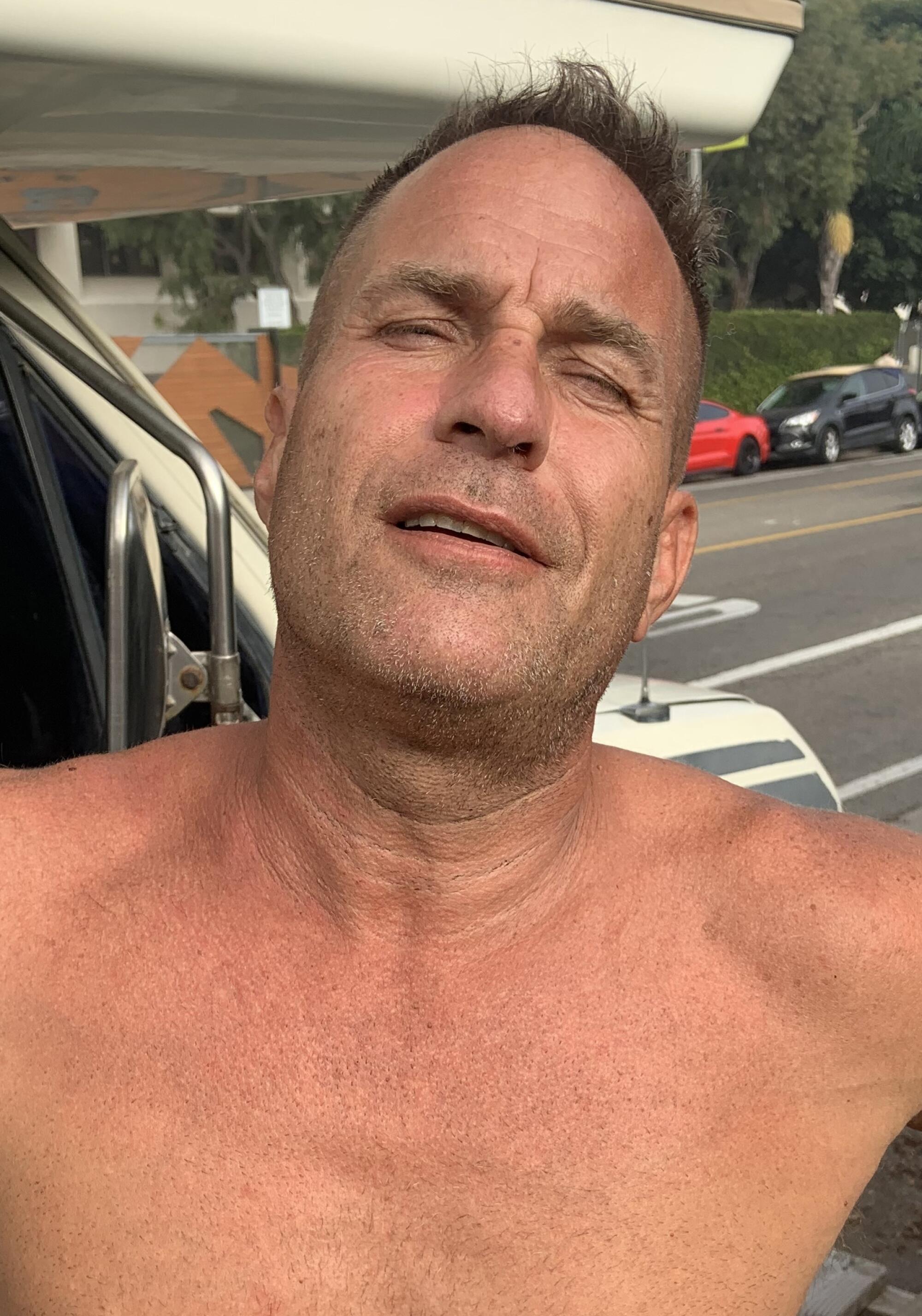
To be honest, I’m not sure I want to be a personal trainer anymore. The industry has changed so much. You’re just a contract worker for a gym. Sometimes you’re there from 5 in the morning until 9 at night. It doesn’t suit me. Maybe I’ll get into private training — more money and better hours…. Ideally, I’d own my own franchise. Or maybe I’ll go back to school and do physical therapy. I’ve been thinking about this a lot. I’m tired of sitting around. I’d like to make better use of my time. I’m weighing things out.
I’ve been at this spot for seven months. I’m lucky to be here. No one hassles me. The guy back there has a ticket on his RV, but I never get ticketed. I think the police can see that I clean up after myself. When it gets cold, in winter, sometimes I’ll rent an apartment, but I don’t want to do that year round because I don’t want to waste money. The last apartment I had was $1,500 for 100 square feet, and it was in the oldest building in the neighborhood. The RV is paid for. I’d rather save money.
Three unhoused women who live in Venice say they have learned to protect themselves, in body and spirit.
I try to be smart. I’ve never lived paycheck to paycheck, my entire life. I try to stay ahead. Yes, those are solar panels on my RV. I’m self-sufficient. I have a business degree. I’ve always been business-minded. When I was 21, I was working for the railroad — rail maintenance — and I invented a failsafe system for trains. When buses stop, they put blocks around the wheels, so the buses don’t move. They do the same thing for planes. I thought they should do it for trains, and I put $50,000 into it over 20 years, thinking I was going to be rich. But it never got off the ground. The railroad industry decided they didn’t want to use something to stop their trains from rolling away. I still have the patent.
Before I moved to Venice I lived in Washington state, where I flipped a house with my partner. We bought a house, redid it, then sold it. We made a good profit. I’ve been wanting to do that kind of thing more, but the timing hasn’t been good on that. Everything’s so expensive now. If I did that again, it’d have to be in the desert — here or in another state. I’d like to try it again. I’d like to make it in a big way, maybe become a millionaire. The middle class is gone now, so I’d like to have a shot at the big time.
Three men who have been staying in the tent city outside the Venice library branch talk about how they came to be there and how they see their futures.
After I broke up with my partner I moved here, for the weather. The cost of living in Seattle is almost the same as it is here, but it rains so much. Back in the day, gas was $1.50 less in Seattle than it is here, but, these days, it’s about the same. I’ve been here four years. I always wanted to come to Venice Beach, since I saw it at 21. I was in the ocean just today.
Robert Karron teaches English at Santa Monica College.
More to Read
A cure for the common opinion
Get thought-provoking perspectives with our weekly newsletter.
You may occasionally receive promotional content from the Los Angeles Times.
